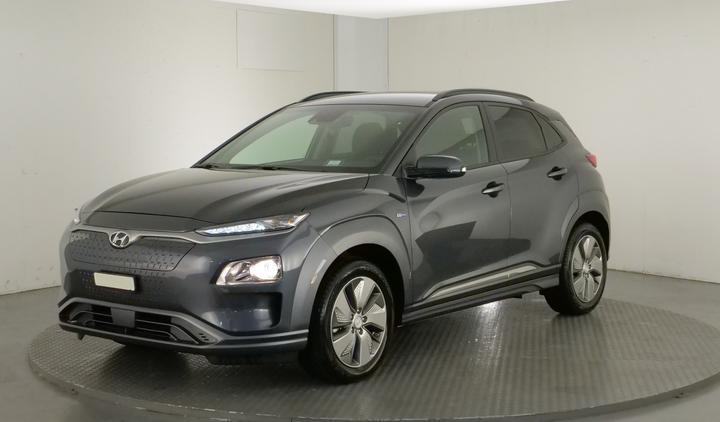
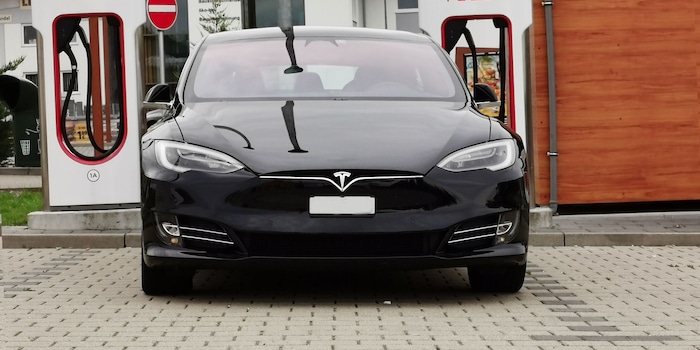
Electric cars: Why Tesla will win the race
The car is slowly charging again. Collected thoughts from petrol stations in Switzerland and Germany on the topic of charging electric cars and their lack of standards.
I'm sitting on a metal spiral staircase near Kriens. For 20 minutes. Behind me, my Hyundai Kona EV is slowly charging. I'm bored. I look out over the Lucerne countryside and think about what I could do near a deserted-looking carpentry workshop and a closed car garage.
That evening, I put a book in the glove compartment.
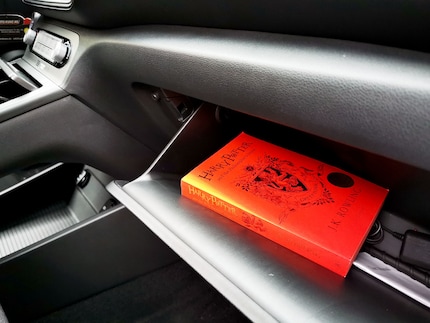
I spend a lot of time at petrol stations. Enough time to think about where the car industry is going. Enough time to speculate, analyse and write.
The problem with electric cars
Electric cars have one big problem: it takes forever and two days to charge them. Imagine a diesel. Or an unleaded one. The tank gets empty, you drive to the petrol station, tap in the tank opening. Five minutes later, you go to the till, say "Three, please" and pay. The cost: somehow 90 francs.
With electric vehicles (EV), things work a little differently. Your battery runs out. You take out your mobile. You search for the nearest charger either on Google Maps or an app such as SwissCharge. It's better to do this in advance, because not all chargers are the same. There are umpteen connections with sometimes more, sometimes less output. You are looking for a kilowatt number. The higher it is, the faster your battery will charge. Unless your car doesn't allow it. This can make your charging experience even longer. You also hope that nobody has parked your charger.
You plug in your car and fiddle with the app until the charging process starts. This process is made more difficult on road trips to eastern Switzerland, for example, by the fact that chargers are widespread in the cool cities - Zurich, for example - but rare in places like Oberriet. Altstätten has a few. So you just have to go charging the evening before and not plan any stages over 200 kilometres.
Then the waiting begins. You now have half an hour. For what? Harry Potter, for example.
Why Tesla will win the race
I wake up video producer Stephanie Tresch. Time to stretch her legs. We're at a motorway service station somewhere between Schaffhausen and Stuttgart. We have 40 minutes until my Tesla Model S has enough juice at the charger to continue our journey. We buy a sandwich, a horrible coffee and a bar of chocolate.
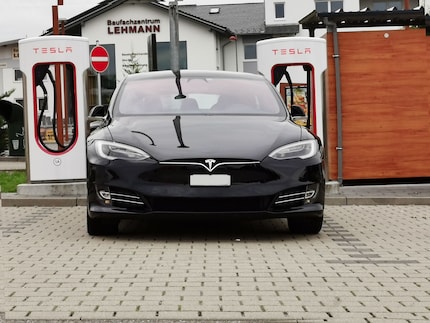
Tesla is doing it right, which will probably give the company victory in the EV field. There is only one plug and charging is free at least throughout Europe, if not worldwide. Sure, Swisscharge and the like aren't expensive either, but free beats 20 francs. Tesla is also very busy aggressively expanding its network of superchargers. So if you run a service station and only have limited space, you can't just offer any plug. If Tesla comes along and asks first, then there will be a Tesla Supercharger. Other cars may be left behind because the car industry can't agree on a standard. We drivers will lose out.
Tesla has made a name for itself. The word Tesla is almost synonymous with the term electric vehicle. I've explained to people at petrol stations that the Kona is "The Hyundai Tesla". By then at the latest, everything was clear.
What costs more? Charging or the time?
I'm sitting in the car in Zurich Altstetten. The Kona is charging and the progress bar is slowly but surely creeping towards 80%. Afterwards, charging is so slow that the battery needs an hour or more for the remaining 20%. I'm so bored that I go to the toilet at the petrol station.
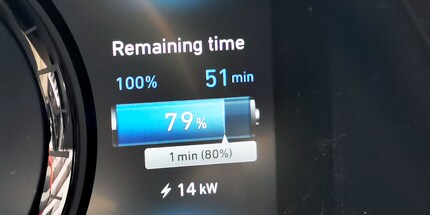
That same evening, I pack a roll of toilet paper in the boot. It should be standard equipment in a car anyway. Not just for the toilet.
The question we have to ask ourselves at the end is the cost: what costs me more? The 60 francs that a petrol car costs more, or the time I spend at petrol stations, at service stations, somewhere in the middle of nowhere in Lucerne, near Stuttgart or in Zurich Altstetten? If I do this during working hours, then I can do the maths. But in my free time, the question is how much quality of life I sacrifice to wait for the percentage display.
The solution to the problem would be simple: a charging station at every underground car park. However, for property managers to be interested in investing money in car parks, the world would have to agree on a charging standard. And not everyone has an underground car park. Or a garage.
This is where the top dog Tesla would be able to make itself popular again. Not only does Tesla have a large network of chargers, it also has the reputation that someone who wants to set standards needs. It would also be a nice mainstay for Tesla if the business with its own cars doesn't work out. Tesla could licence its charging technology and its Superchargers. A car manufacturer such as Hyundai or Mercedes would then pay Tesla a fee and drivers could then charge their cars at Superchargers.
I don't have a really clever answer to the question of what is worth more - time or electricity. Because when you drive an EV, you don't have a choice. If you make a conscious decision in favour of less carbon dioxide, then you accept that. In my case, one of my passions, reading, is moving from the sofa to petrol stations. It's something that doesn't bother me. It's good to take a break now and again. But I keep getting caught up in the thought "I could just...". Because petrol stations are not the cultural hotspot of our society.
Why Teslas are expensive, but then they're not
Harry Potter will have to wait a minute. Because I need to look something up. I'm sitting in the Kona. It's about 1 o'clock in the morning. I have to do a longer stage tomorrow, but I don't want to get up any earlier. I won't get any more sleep, but I don't have to hang around at a petrol station early in the morning where the chargers might be busy or parked up. The latter happens more often in cities. Obviously the petrol drivers think that nobody drives an EV anyway and so you can just park in the charging spots. I'm suddenly interested in pricing policy. Because if you're hanging out alone at a petrol station late at night, you're interested in that.
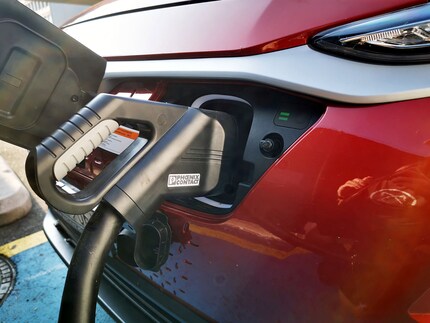
Teslas are damn expensive vehicles. The entry-level version of the Model 3 without extras is available from 47,000 francs. But there are hardly any follow-up costs. Charging the battery is also free. If you connect another car to the Tesla Supercharger, it's theft. But as a Tesla owner, you still pay for the electricity, just in advance.
This makes it easy for other EVs to be priced below the Teslas. At 100,000 francs, the Porsche Taycan without extra equipment is cheaper than the 2019 Tesla Model S at 122,000 francs.
A Kona EV can easily compete with the big players on the market with its maximum price of 45,000 francs. As a favourable alternative. But then with follow-up costs. According to initial indications, so does the Taycan.

The future could therefore look like this. The Taycan, Kona and co. will be more expensive to buy, but the electricity will be free thanks to Superchargers. Everyone who buys a Kona or a Taycan pays a little extra and can charge for free forever.
Meanwhile, Tesla continues to expand its network, sets a standard and everyone is happy. Although this makes little sense from a market economy point of view, the train has left the station to try and outdo Tesla. If someone wants to do that, it will either be with outstanding performance and phenomenal marketing. Or Tesla will screw things up so badly internally that they will have to close up shop. Because if you can describe an EV where "Porsche Taycan" fails with "Porsche-Tesla" and everyone knows which vehicle you mean, then there is a standard. The model with the high entry price and low follow-up costs works, the cars are popular.
It would do the industry good to take a leaf out of Tesla's book. Even if that doesn't mean compatibility with the American Superchargers, the pricing model can be adopted. That also sounds great in terms of marketing: "Never pay for petrol again"? Great, even if it's not petrol at all. And not "Charge your innovative EV at one of the 23 high-quality charging stations in Switzerland at discounted rates."
There is no focus on that. Hyundai makes the Kona in what feels like 20 editions. Tesla says "This is the Model S and that's it". Porsche does it slightly better with "This is the Taycan and that's it". And nobody can or wants to deny that the Taycan is a Porsche. The Taycan could be nothing but a Porsche. Other car manufacturers are muddling around with their EV suppliers on sale and diluting their own market in the process.
Meanwhile, Tesla remains straightforward. Company founder Elon Musk even wants to stifle promotions and special offers. Because everyone who wants to buy a Tesla should have the same conditions for the same performance. Plus no follow-up costs and a good network of Superchargers. That is revolution. Not the rubbish from other corners.
So, that's it. Battery is back to about 80%. Anything above that will be complicated and time-consuming. I'm driving on.
Journalist. Author. Hacker. A storyteller searching for boundaries, secrets and taboos – putting the world to paper. Not because I can but because I can’t not.
Interesting facts about products, behind-the-scenes looks at manufacturers and deep-dives on interesting people.
Show all

